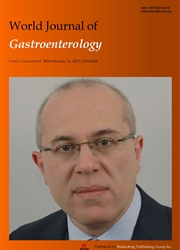

 中文摘要:
中文摘要:
瞄准:在 Huh7 房间在 Bcl-2 表示的 Huh7 房间,和变化上调查 Gli-1 小干扰 RNA (siRNA ) 的效果。方法:人的肝细胞癌房间 Huh7 被使用。房间生存能力被 3- 分析(4, 5-Dimethylthiazol-2-yl )-2, 5-diphenyl tetrazolium 溴化物(MTT ) 试金。Gli-1 和 Bcl-2 家庭成员的表情被 RT-PCR 和西方的污点检测。Apoptosis 被流动血细胞计数用 propidium 碘化物检测,由染色的 Hoechst 33258 测量了使用先进萤光显微镜检查和 caspase-3 酶的试金。细胞生长是有 Gli-1 siRNA 和 5 氟尿嘧啶(5-Fu ) 的分析术后疗法。结果:在通过 Gli-1 siRNA 的 Huh7 房间的 Gli-1 mRNA 的抑制减少了房间生存能力。Gli-1 siRNA 处理也由三个标准, sub-G1 房间周期部分的增加,原子冷凝作用,典型地代表 apoptosis 的一个词法变化,和 caspase-3 的激活导致了 apoptosis。Gli-1 siRNA 对下面调整 Bcl-2 也有能力。然而, Gli-1 siRNA 在 Bcl-xl 导致了没有重要变化, Bax,坏,并且出价。而且, Gli-1 siRNA 在 Huh7 房间上增加了 5-Fu 的细胞毒素的效果。结论:Bcl-2 的下面规定在 Gli-1 siRNA 在 HCC 房间导致的 apoptosis 起一个重要作用。有化学疗法的药的联合 Gli-1 siRNA 能对 HCC 代表更有希望的策略。策略的效果需要推进调查在活体内并且可以有潜在的临床的申请。
 英文摘要:
英文摘要:
AIM: To investigate the effects of Gli-1 small interference RNA (siRNA) on Huh7 cells, and the change of Bcl-2 expression in Huh7 cells. METHODS: Human hepatocellular carcinoma cells Huh7 were used. Cell viability was analyzed by 3-(4, 5-Dimethylthiazol-2-yl)-2, 5-diphenyl tetrazolium bromide (MTT) assay. The expressions of Gli-1 and Bcl-2 family members were detected by RT-PCR and Western blot. Apoptosis was detected by Flow cytometry using propidium iodide, measured by Hoechst 33258 staining using Advanced Fluorescence Microscopy and caspase-3 enzymatic assay. Cell growth was analyzed after treatment with Gli-1 siRNA and 5-fluorouracil (5-Fu). RESULTS: Inhibition of Gli-1 mRNA in Huh7 cells through Gli-1 siRNA reduced cell viability. Gli-1 siRNA treatment also induced apoptosis by three criteria, increase in the sub-G1 cell cycle fraction, nuclear condensation, a morphologic change typical of apoptosis, and activation of caspase-3. Gli-1 siRNA was also able to down-regulate Bcl-2. However, Gli-1 siRNA resulted in no significant changes in Bcl-xl, Bax, Bad, and Bid. Furthermore, Gli-1 siRNA increased the cytotoxic effect of 5-Fu on Huh7 cell. CONCLUSION: Down-regulation of Bcl-2 plays an important role in apoptosis induced by Gli-1 siRNA in HCC cells. Combination Gli-1 siRNA with chemotherapeutic drug could represent a more promising strategy against HCC. The effects of the strategies need further investigation in vivo and may have potential clinical application.
 同期刊论文项目
同期刊论文项目
 同项目期刊论文
同项目期刊论文
 Involvement of PI3K/PTEN/AKT/mTOR pathway in invasion and metastasis in hepatocellular carcinoma: As
Involvement of PI3K/PTEN/AKT/mTOR pathway in invasion and metastasis in hepatocellular carcinoma: As Bead-based microarray analysis of microRNA expression in hepatocellular carcinoma: miR-338 is downre
Bead-based microarray analysis of microRNA expression in hepatocellular carcinoma: miR-338 is downre Downregulation of ZIP kinase is associated with tumor invasion, metastasis and poor prognosis in gas
Downregulation of ZIP kinase is associated with tumor invasion, metastasis and poor prognosis in gas 期刊信息
期刊信息
